
Zadie Smith FRSL is an English novelist, essayist, and short-story writer. Her debut novel, White Teeth (2000), immediately became a best-seller and won a number of awards. She became a tenured professor in the Creative Writing faculty of New York University in September 2010.

Robert Lowell Coover is an American novelist, short story writer, and T.B. Stowell Professor Emeritus in Literary Arts at Brown University. He is generally considered a writer of fabulation and metafiction.

Jamaica Kincaid is an Antiguan-American novelist, essayist, gardener, and gardening writer. She was born in St. John's, Antigua. She lives in North Bennington, Vermont and is Professor of African and African American Studies in Residence at Harvard University during the academic year.

George Saunders is an American writer of short stories, essays, novellas, children's books, and novels. His writing has appeared in The New Yorker, Harper's, McSweeney's, and GQ. He also contributed a weekly column, American Psyche, to The Guardian's weekend magazine between 2006 and 2008.
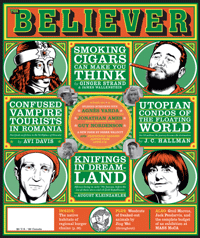
The Believer is an American bimonthly magazine of interviews, essays, and reviews, founded by the writers Heidi Julavits, Vendela Vida, and Ed Park in 2003. The magazine is a five-time finalist for the National Magazine Award.
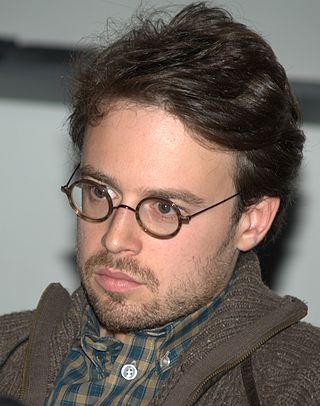
Joshua Aaron Cohen is an American novelist and story writer, best known for his works Witz (2010), Book of Numbers (2015), and Moving Kings (2017). Cohen won the 2022 Pulitzer Prize for Fiction for his novel The Netanyahus (2021).

Benjamin S. Lerner is an American poet, novelist, essayist, critic and teacher. The recipient of fellowships from the Fulbright, Guggenheim, and MacArthur Foundations, Lerner has been a finalist for the National Book Award for Poetry and the Pulitzer Prize for Fiction. Lerner teaches at Brooklyn College, where he was named a Distinguished Professor of English in 2016.

Laura Kipnis is an American cultural critic and essayist. Her work focuses on sexual politics, gender issues, aesthetics, popular culture, and pornography. She began her career as a video artist, exploring similar themes in the form of video essays. She is professor of media studies at Northwestern University in the Department of Radio-TV-Film, where she teaches filmmaking. In recent years she has become known for debating sexual harassment and free speech policies in higher education.
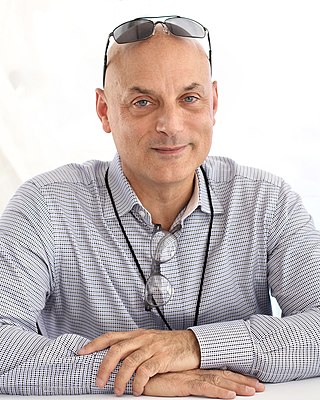
Daniel Adam Mendelsohn is an American author, essayist, critic, columnist, and translator. Best known for his internationally best-selling and award-winning Holocaust family memoir The Lost: A Search for Six of Six Million, he is currently the Charles Ranlett Flint Professor of Humanities at Bard College, the Editor at Large of the New York Review of Books, and the Director of the Robert B. Silvers Foundation, a charitable organization dedicated to supporting writers of nonfiction.

Ben Katchor is an American cartoonist and illustrator best known for the comic strip Julius Knipl, Real Estate Photographer. He has contributed comics and drawings to The Forward, The New Yorker,Metropolis, and weekly newspapers in the United States. A Guggenheim Fellowship and MacArthur Fellowship recipient, Katchor was described by author Michael Chabon as "the creator of the last great American comic strip."

Rebecca Solnit is an American writer. She has written on a variety of subjects, including feminism, the environment, politics, place, and art.
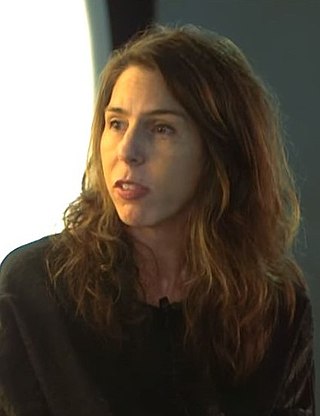
Rachel Kushner is an American writer, known for her novels Telex from Cuba (2008), The Flamethrowers (2013), and The Mars Room (2018).
Hilton Als is an American writer and theater critic. He is a teaching professor at the University of California, Berkeley, an associate professor of writing at Columbia University and a staff writer and theater critic for The New Yorker magazine. He is a former staff writer for The Village Voice and former editor-at-large at Vibe magazine.

Mansplaining is a pejorative term meaning "(for a man) to comment on or explain something, to a woman, in a condescending, overconfident, and often inaccurate or oversimplified manner". Author Rebecca Solnit ascribed the phenomenon to a combination of "overconfidence and cluelessness". Lily Rothman, of The Atlantic, defined it as "explaining without regard to the fact that the explainee knows more than the explainer, often done by a man to a woman".
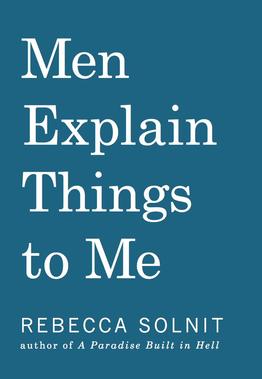
Men Explain Things to Me is a 2014 essay collection by the American writer Rebecca Solnit, published by Haymarket Books. The book originally contained seven essays, the main essay of which was cited in The New Republic as the piece that "launched the term mansplaining", though Solnit herself did not use the word in the original essay and has since rejected the term. The September 2015 expanded edition of the book included two new essays: "Cassandra Among the Creeps" and "#YesAllWomen: Feminists Rewrite the Story."

Golda Meir is an outdoor bronze sculpture of former Israeli prime minister Golda Meir. The sculpture is located at Golda Meir Square near Broadway and 39th Street in the Garment District of Manhattan, New York. It was unveiled in 1984. It is one of only five statues of women in New York City as of 2016.
Gaiutra Bahadur is a Guyanese-American writer. She is best known for Coolie Woman: The Odyssey of Indenture, which was shortlisted for the Orwell Prize in 2014.
Alexandra Lange is an American architecture and design critic and author based in New York. The author of a series of critically acclaimed books, Lange is the architecture critic for Curbed. She has bylines published in The New Yorker, The New York Times, The Atlantic, Metropolis, Architect magazine, Architectural Digest; Architectural Record, The Architect’s Newspaper, Cite; Domus; Domino; Dwell; GOOD; Icon, The Nation, New York magazine, Places Journal, Print and Slate. Lange is a Loeb Fellow, and her work has been recognized through a number of awards, including the 2019 Steven Heller Prize for Cultural Commentary.

Wade Livingston Graham is an American author, historian, environmentalist, and garden designer. Graham works at a confluence of several disciplines, including environmental history, landscape design, critical urbanism, art, and politics. He is a garden designer based in Los Angeles, and is an environmental historian of the Western United States, especially Molokai in the Hawaiian Islands and the political ecology of Glen Canyon. Graham has published several books on urbanism, landscape design, and environmental history. In addition to his books, Graham has contributed articles to The New Yorker, Harper's Weekly, The Los Angeles Times, and Outside on various subjects for more than twenty years.
The cartography of New York City is the creation, editing, processing and printing of maps that depict the islands and mainland that now comprise New York City and its immediate environs. The earliest surviving map of the area is the Manatus Map.















